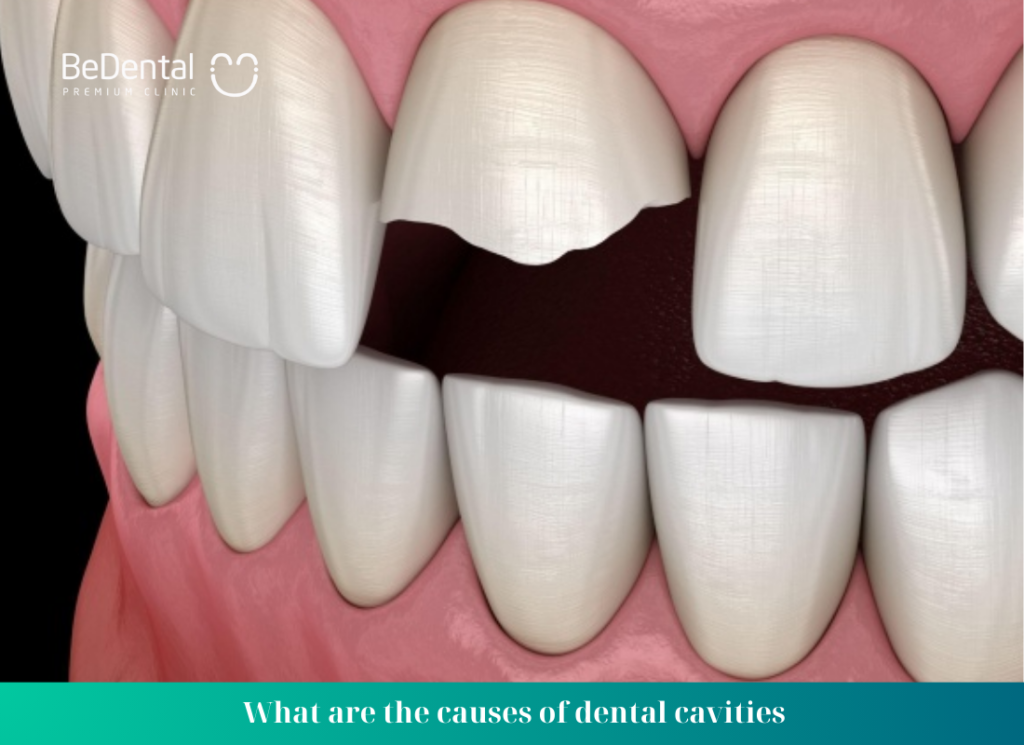A dental cavity, also known as a tooth cavity or dental caries, is a common condition and anyone is at risk of developing cavities. Dental cavities can cause irritation to the tongue and gums if not treated promptly. Many people often wonder, “What are the causes of dental cavities? What is a dental cavity? What are the Methods for preventing dental cavities?” Let’s explore these questions in the following article.
What is a dental cavity?
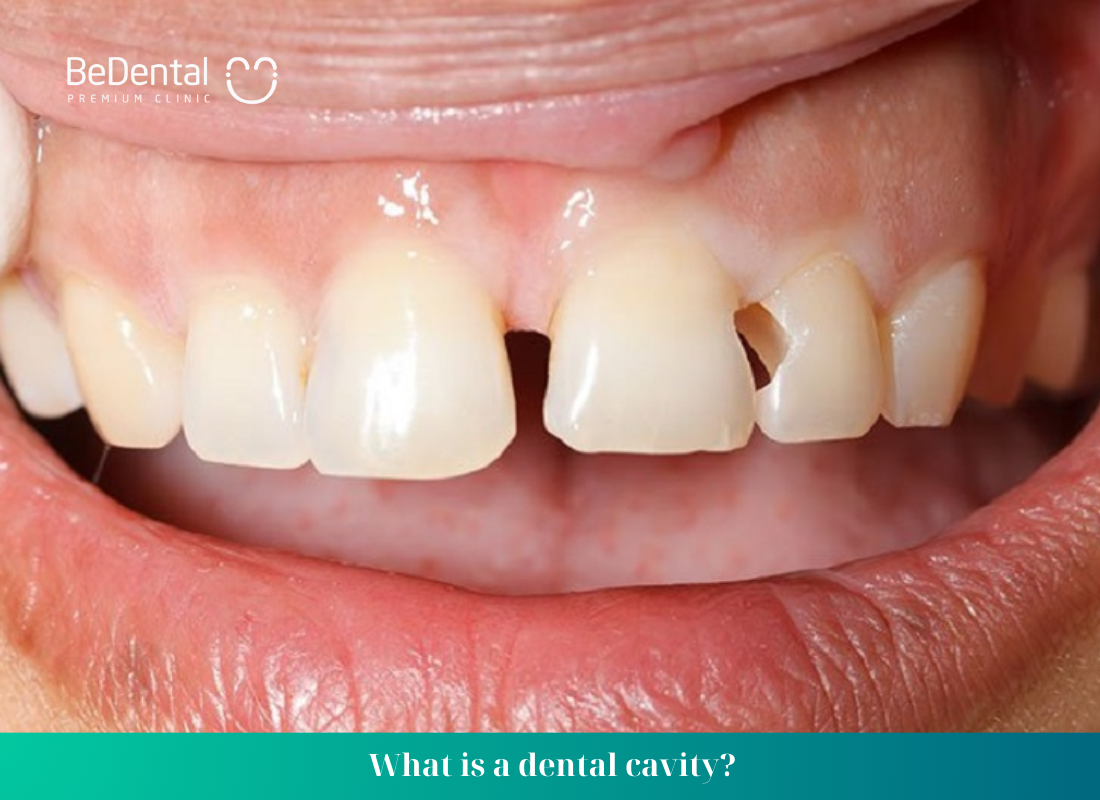
A dental cavity occurs when the tooth enamel, the protective outer layer, becomes damaged due to factors such as strong impact, excessive chewing force, or oral health issues. Although cavities do not have a serious impact on overall health, they can cause difficulties with eating and lead to the following problems:
- Cavities expose the dentin and tooth pulp, causing sensitivity and discomfort when eating or exposed to cold air.
- Cavities provide an opportunity for bacteria and harmful agents to invade the inner structures of the tooth, posing a risk to oral health.
- If left untreated, cavities can lead to tooth loss.
- Teeth play an important role in chewing food, so when they are decayed or fractured, they can create sharp edges and cause injury in the mouth, making eating and contact painful.
What are the causes of dental cavities?
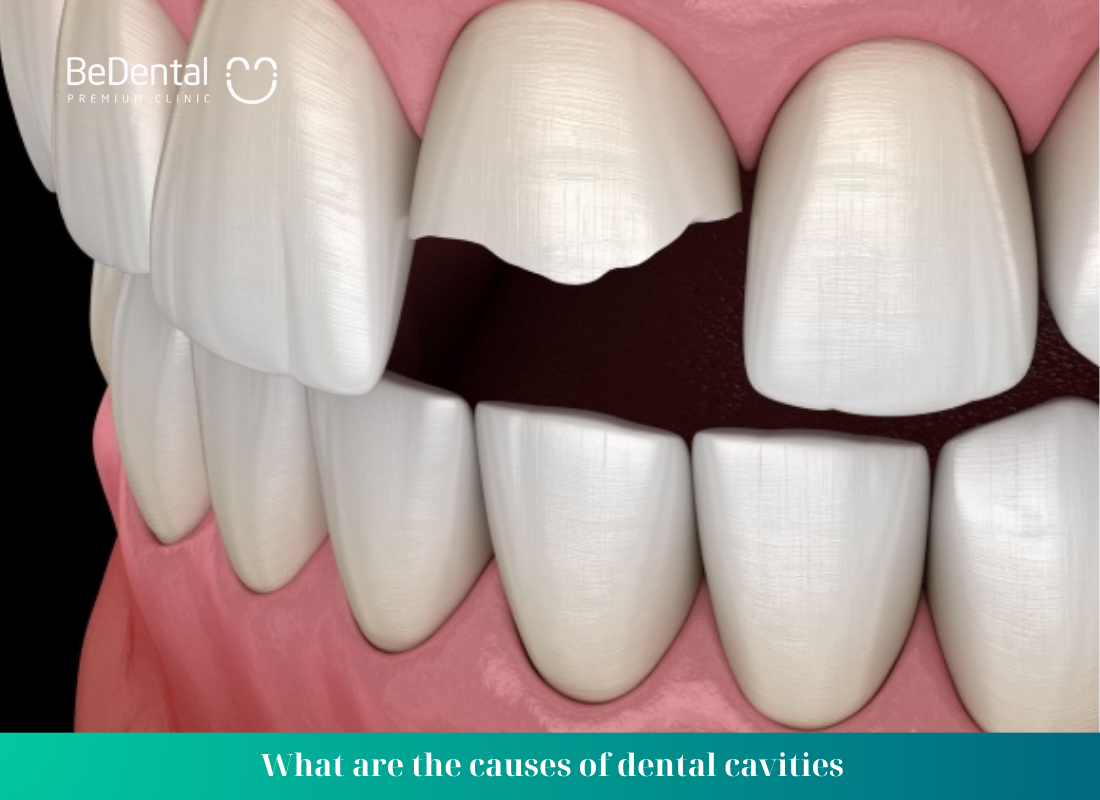
What are the causes of dental cavities? Dental cavities are a common issue and can pose various risks if not cared for in a timely manner. Understanding the causes of dental cavities can help with better prevention:
- Trauma: Trauma is the most common cause of dental cavities. This condition can occur due to traffic accidents, strong impacts, or falls.
- Tooth decay: Tooth enamel erosion caused by bacterial spread from tooth decay can weaken the tooth structure. As the enamel gradually wears away, the dentin and tooth pulp can easily crack or fracture upon external impact.
- Biting at an angle or prolonged chewing of hard objects: Pressure from biting at an angle or chewing on hard objects for an extended period can weaken and make the teeth susceptible to cavities.
- Improper dental implants: Improperly performed dental implants, or those done by inexperienced professionals, can lead to dental cavities. However, this is a rare occurrence.
- Overbrushing or using a hard-bristle toothbrush: Brushing too vigorously or using a toothbrush with hard bristles can cause damage to the tooth enamel. Choosing a toothbrush with soft bristles and avoiding excessive force can help prevent cavities.
See more: Should I get dental check-ups at hospital or private clinic?
2. How does dental cavity affect your life?
Dental cavities have a significant impact on your life, even if you may not initially notice it. The consequences of dental cavities include:
- Cavities in the back of the mouth may not significantly affect aesthetics. However, if left untreated, they can lead to dental conditions as food gets trapped and is not thoroughly cleaned.
- Cavities that expose the tooth pulp can cause sensitivity. In such cases, you may experience tooth pain when exposed to changes in weather or hot and cold food. Toothaches may occur more frequently at night and can cause intense pain.
- Cavities increase the risk of bacterial invasion, leading to infection, gum inflammation, bleeding gums, bad breath, and damage to soft tissues in the mouth.
- Cavities create sharp and pointed edges that, if accidentally come into contact with the tongue or cheek, can cause bleeding or mouth ulcers.
- Dental cavities impair chewing function. When food is not properly masticated, it can lead to digestive issues such as stomach pain, digestive disorders, and overall health problems.
- People with dental cavities may have difficulty pronouncing certain sounds, such as “h,” “g,” “x,” “s,” “tr,” “ch,” “ph,” especially when learning English.
- In physiognomy, dental cavities are considered omens of financial risks, weakened health, and difficulties in the future.
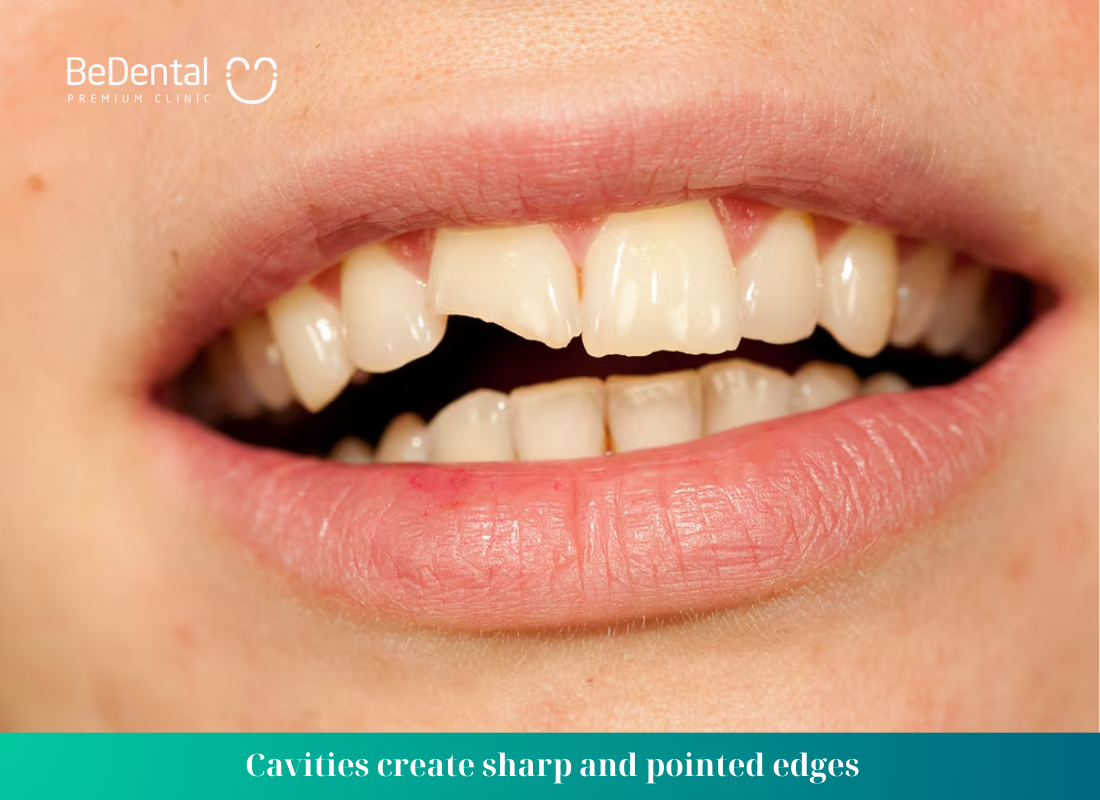
3. How should a broken tooth be treated?
When a tooth is broken, it can cause pain and affect your daily health and life. Therefore, when faced with this situation, it is important to find a comprehensive solution to avoid negative impacts in the future.
Unlike other parts of the body, teeth cannot heal themselves and require intervention from dental professionals. Currently, there are many methods for treating broken teeth, but it is important to determine the cause in order to choose the appropriate method and ensure effectiveness.
3.1. Filling the broken tooth
Filling the broken tooth: This is a simple dental technique that does not take much time. You only need to visit the dental clinic once for the dentist to examine and use specialized dental materials to fill the crack on the tooth surface. Composite is the most common dental filling material nowadays, which has a color similar to the natural tooth enamel.
What does a broken tooth symbolize? Decoding the meaning of a dream about a broken tooth.
3.2. Dental crowns for broken teeth
The method of dental crowns helps to firmly attach the tooth to the surface, preventing the tooth from becoming crooked or fractured during chewing.
The process of dental crowns begins by grinding the outer layer of the tooth to create a foundation for the crown. Then, the dental crown is attached to this foundation using specialized adhesive.
Dental crowns not only address issues such as cracks, fractures, discoloration, and antibiotic staining but also aim to improve the aesthetics of your teeth, making them more even and brighter.
Methods for preventing dental cavities
What are the methods for preventing dental cavities? There are preventive measures to maintain the health of your teeth and gums. Dental cavities are a common problem that can cause trouble if not prevented in a timely manner. Here are some effective preventive measures you can consider:
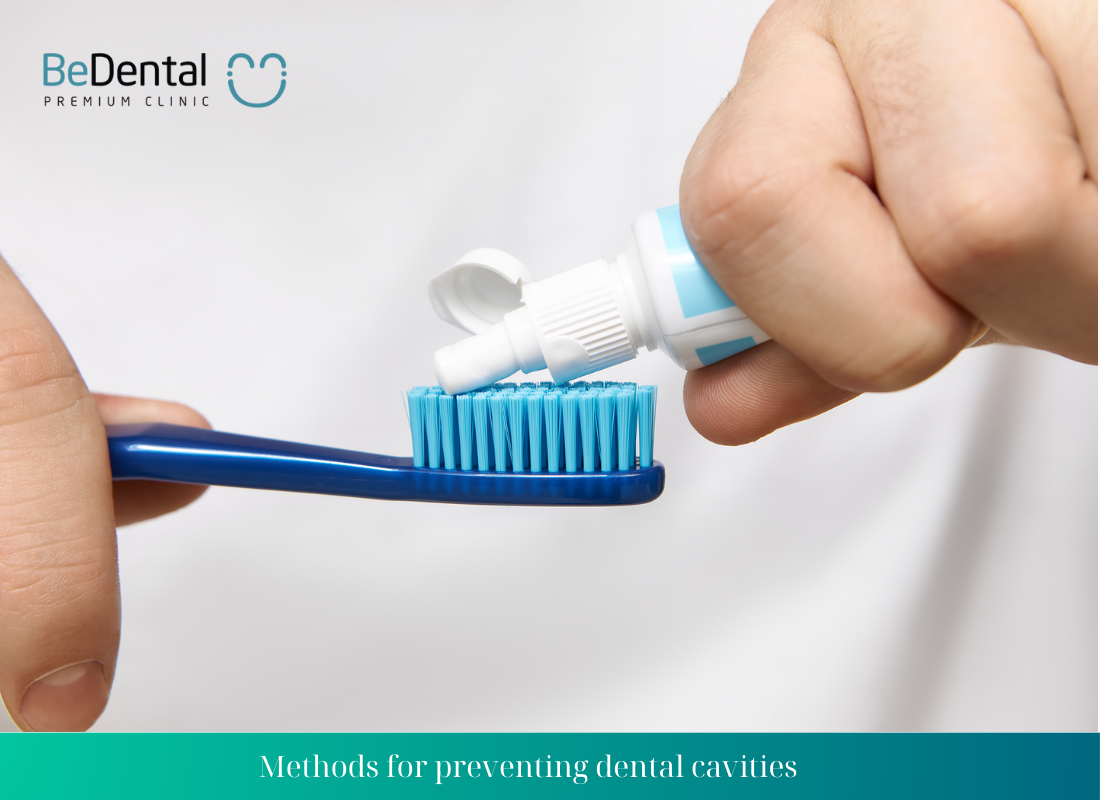
- Daily oral care: Ensure to brush your teeth at least twice a day and use dental floss to clean between your teeth.
- Regular check-ups: Regular dental check-ups will help detect dental cavity-related issues early and provide timely treatment.
- Avoid sugary drinks: Sugary drinks and foods can harm your teeth, limiting their consumption will help protect your dental health.
- Use fluoride toothpaste: Fluoride protects the tooth enamel from decay and helps restore damaged enamel.
- Adjust your diet: Balanced eating and limiting sugary foods help maintain dental health and prevent the formation of cavities.
- Use mouthguards during sports activities: To protect your teeth from injuries during sports, use either fixed or soft mouthguards.
- Brush properly: Gently brush your teeth in circular motions and avoid applying excessive pressure. Brush thoroughly on the front, back, and in between the teeth.
- Limit exposure to cavity-causing foods: Avoid eating hard foods or using your teeth to open bottle caps or containers. This helps reduce the risk of dental cavities.
These methods will help you effectively prevent dental cavity-related issues. However, for more information and specialized advice, it is still recommended to regularly visit a dental professional for the best support!
Tư vấn chuyên môn bài viết:
BÁC SĨ DƯƠNG THỊ THÙY NGA
BEDENTAL - TOP STANDARD DENTISTRY SYSTEM
In HANOI
Address 1: 7B Thi Sach St, Ngo Thi Nham, Hai Ba Trung Dist, Ha Noi. - 0934.61.9090
Address 2: 343 Tay Son St, Nga Tu So Ward, Dong Da Dist, Ha Noi. (Nga Tu So Cross) - 0934.61.9090
Address 3: CC2 Tower Nguyen Huu Tho St, Dinh Cong Ward, Hoang Mai Dist, Ha Noi. (Inside True Hope ) - 0934.61.9090
In HO CHI MINH
Address 1: 53 -55 -57 Pho Duc Chinh St, Nguyen Thai Binh, Dist. 1, Ho Chi Minh. - 0766.00.8080
Address2: 25, City Land urban area, Go Vap Dist, Ho Chi Minh - 0766.00.8080
Working: 9am - 6pm everyday
Website: https://bedental.vn/en/

